8:30 in the morning, Lin Shu-Jhen and Chen Li- Ping make their way into a 165.5m2 apartment in Daan district, Taipei City, lay down their toolboxes and began cleaning the house. They start by sweeping the floor, then scraping away the water stains on the glass in the toilet, as well as the oil stains on the cooker hood. Whether it's under the sofa, between the window tracks or inside the light fixtures, however detailed and impossible to clean, they will work meticulously and repeatedly, leaving no stain behind.
Sweating as they may, they never lose the smile on their faces. After they are done with the place, the clutters in the living room are returned to their rightful places and the dining room floor is no longer sticky. 4 hours later, house cleaning service is completed on time, and the house is reborn again.
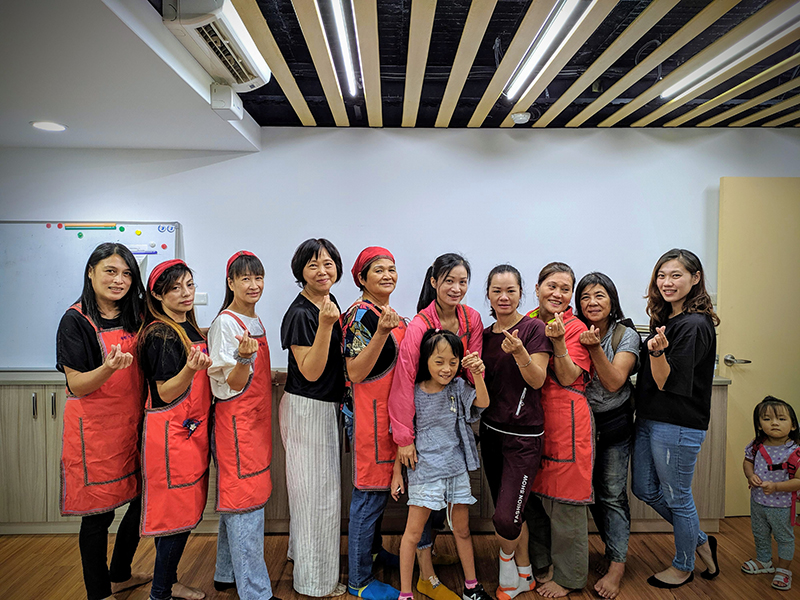
Domestic cleaners at Enjoy Cleaning meet regularly to discuss businesses in the organization, and to share with one another recent events in their lives.
Employment Hard to Come By for Urban Indigenous Women,
Enjoy Cleaning Forms a Matchmaking Platform
“My former company replaced me with a cheaper migrant worker.” Lin Shu-Jhen is Pangcah and a single mother who used to work as an operator in a factory. A little over a year ago, she lost her job and source of income. Depressed, she registered at Employment Service Station for a job and stumbled across the recruiting information for domestic cleaners by Enjoy Cleaning, a home cleaning company. Many urban indigenous women start their second career here.
Chen Li-Ping, also Pangcah, has similar experiences. She worked at a fried chicken cutlet shop, then sewed clothes for a garment factory later, but with the textile industry relocating overseas, she was getting fewer jobs and losing income. Chen Li-Ping and Lin Jin-Syun later met in an indigenous language program, the latter has been working at Enjoy Cleaning and referred Chen to the company.
“I moved back to Hualien for 4-5 years, but it just wasn't easy getting a job.” Lin Jin-Syun is also a single mother, she returned home to Hualien but could only find work as housekeeping in the hotel. The hours were long, which made it difficult for her to take care of her three children.
The stories of these three women represent in a nutshell the stories of urban indigenous women seeking employment. Faced with the multiple disadvantages of economy, gender and ethnicity, indigenous women often must assume the responsibility of domestic labor while trapped in a state of low labor income. Having observed how difficult it is for urban indigenous women to seek employment, Zhi-Shan Foundation established Enjoy Cleaning in 2015, matching indigenous mothers who excel at home cleaning with families that require cleaning services.
Social worker Tien Shu-Wei at Zhi-Shan Foundation says that domestic cleaners work short hours and on a flexible schedule. They only need to work 4-6 hours a day, which is perfect for indigenous women who have preschool children at home. When Enjoy Cleaning was first established, it mainly relied on the Foundation to seek clients. But as their reputation built up, Enjoy Cleaning now has 27 domestic cleaners, with 90% of which are indigenous peoples. Enjoy Cleaning serves over 200 clients. In addition to homes, cleaning services are also provided to offices, cram schools or daily rentals.
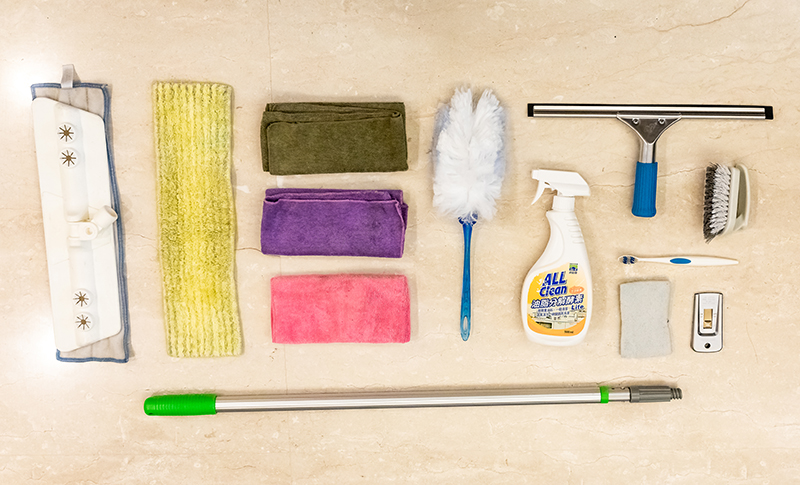
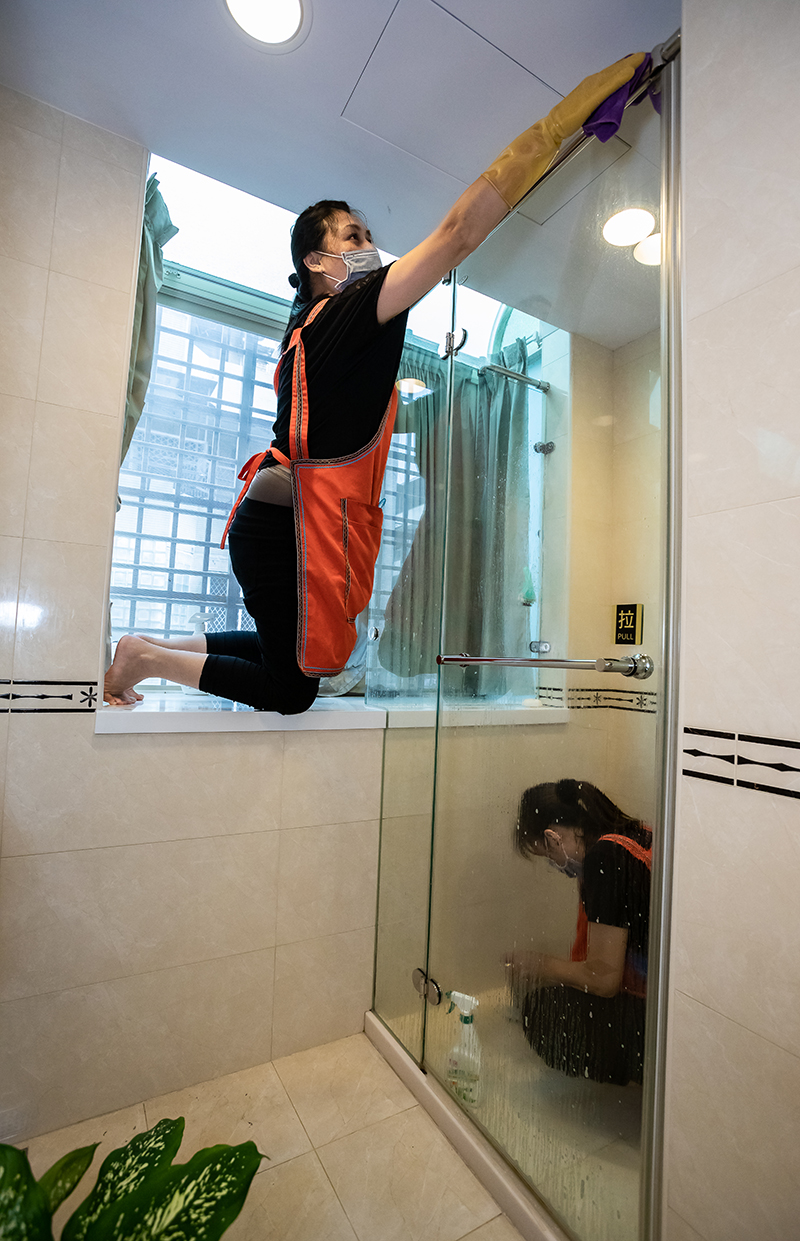
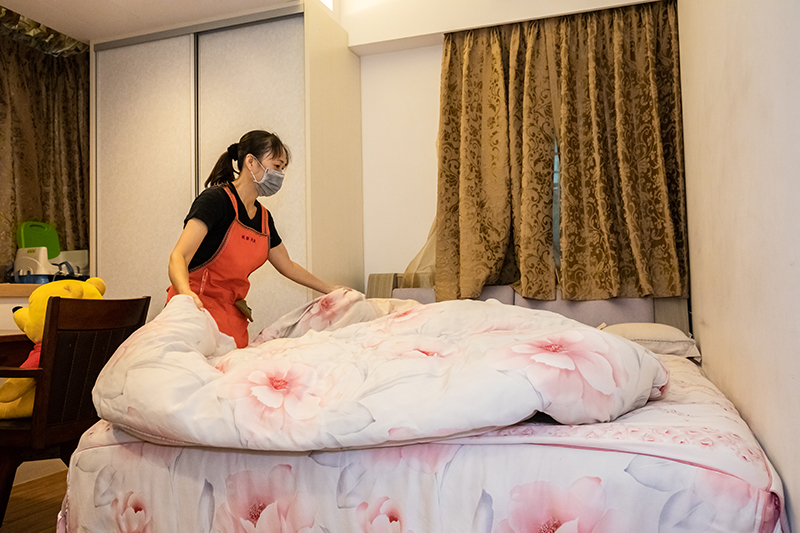
Some homes are cleaned by more than one domestic cleaners at once while others are cleaned by one only, as per client's request. Home cleaning requires many tools, from rags, brushes, cleaning products to scrapers, you can find everything in the toolboxes of the domestic cleaners.
Direct Communication with Client is Encourage,
Build Up Their Expertise and Confidence
Home cleaning is professional work but most domestic cleaners at Enjoy Cleaning had no prior experience in professional home cleaning; Zhi-Shan Foundation provides a 46-hour training, including the academic and practical knowledge which cover descaling in the bathroom, tidying up in the living room, degreasing in the kitchen, and doing, folding and putting away the laundry. Eventually, they are required to enter a client's house for hands-on training as the final exam. They must pass the test before they can officially wear the apron with an indigenous totem embroidered on and provide cleaning services to busy families in the city.
As per standard procedure, a four-hour cleaning service includes 1.5 hours in the kitchen, 30 minutes in the bathroom, and the remaining 2 hours allocated to the living room and bedrooms as seen fit. In principle, they work their way from the back of the house to the front. Chen Li-Ping says that the domestic cleaner must first quickly scan the site, allocate appropriate cleaning time to each area according to the current status, and complete in time; if the client has requested extra focus in certain areas, they must also try to fulfill the request. Occasionally, the client will ask domestic cleaners to help prune the potted plants on the balcony, and Chen Li-Ping will find time to remove the withering twigs in the plants.
“We encourage our cleaners to communicate directly with clients.” Tien Shu-Wei stated that clients at Enjoy Cleaning have often had previous unpleasant experiences with other home cleaning companies, and through frequent in-depth conversations, domestic cleaners can understand more of the client's needs, becoming the best domestic helper for the client.
Domestic cleaners share that they've had clients who complain that pet hair can still be found after they have cleaned the house, but it was because the animal was shedding frequently during the season change, which will inevitably leave hair; they've also had clients who think that they took too long cleaning the kitchen, and accused them of being lazy. Quite the contrary, domestic cleaners use cleaning tools that are environmental-friendly, no chemical cleaners. If they have the opportunity to interact with clients in the house, clients will understand via direct contact and communication how hard domestic cleaners work to give them a clean environment without involving chemical products, leaving them more reassured and trusting.
Stable Income and Compliments from the Client
Motivate Domestic Cleaners
Domestic cleaners are easy to figure out, compliments and criticism from the client dictate their mood.
Home is the most private fortress in modern society, in addition to the fundamental cleaning techniques, domestic cleaners must also be able to read minds. Some clients are friendly and like to chat with domestic cleaners, others like their privacy and wish to not be in the same room at the same time. Whether to venture forward will be up to the discretion of the domestic cleaners. Lin Shu-Jen admits that she is always a little anxious when entering the house of a new client. Even though she has a rough idea of the client's cleaning requirements, she is still worried if she will strike the wrong chord. Sometimes they encounter clients who like to place objects in places that are easily overlooked on purpose, such as between window tracks, just to see if the domestic cleaner is thorough.
If they encounter clients who don't trust them, domestic cleaners might also ask to be replaced. Lin Jin-Syun once had a client who accused her more than once of not doing her job well, because she was unable to remove the mold in the bathroom ceiling. It caused a grudge on both sides, so she asked the company to replace her with another domestic cleaner. “We actually care more than our client does if their house is not clean.” Thinking back, Lin Jin-Syun still feels that she is wronged, saying that if the stain is really old, it doesn't matter how hard you clean, it is impossible to make it as good as new. Tien Shu-Wei also mentions that every time domestic cleaners meet at the office, they discuss their secret cleaning techniques, and are always trying to come up with ways to better clean clients' homes.
But when speaking of their greatest sense of achievement, the domestic cleaners all say at once, “seeing the client's house sparkle!” Chen Li-Ping once had a client who said to her in earnest, “our home is not a home until you cleaned it, it felt completely different!” There are also clients who turn compliments into actions and increase the hours of their regular cleaning service. Because they work very hard, a compliment alone from the client is enough to keep the domestic cleaners excited for an entire day.
Tien Shu-Wei says that many indigenous mothers were not confident when they first applied to work as domestic cleaners, feeling inferior in this job. But as they began establishing a mutual understanding with clients, demonstrate the value of their labor, and when their lives are no longer financially burdened, they gradually begin to smile and become more confident in explaining to clients how they were able to solve the difficult cleaning problems at hand.
“It comes with a sense of achievement and stable income. It is the best job I've ever had!” Lin Jin-Syun says with a big smile. After they complete their cleaning assignment for the morning, the three mothers embark on their returning trip each hauling their own toolbox. Some have children to pick up, some are heading towards the next cleaning project, whatever their destinations, they truly enjoy cleaning now.
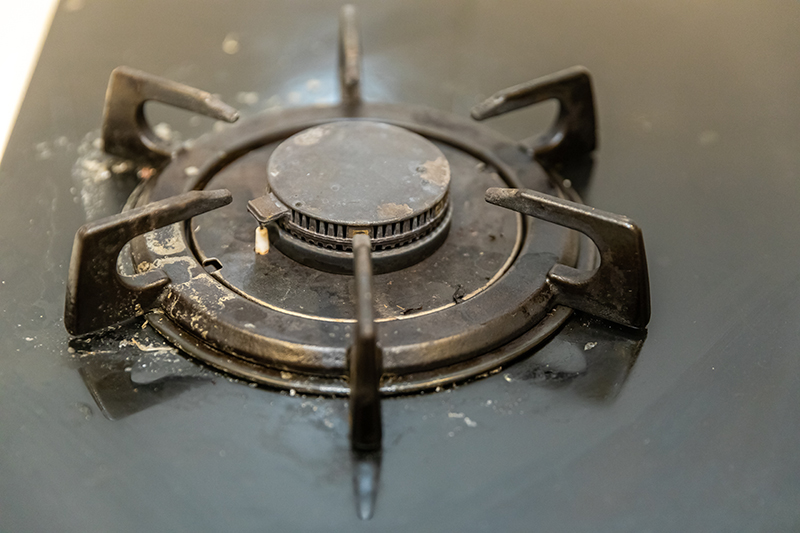
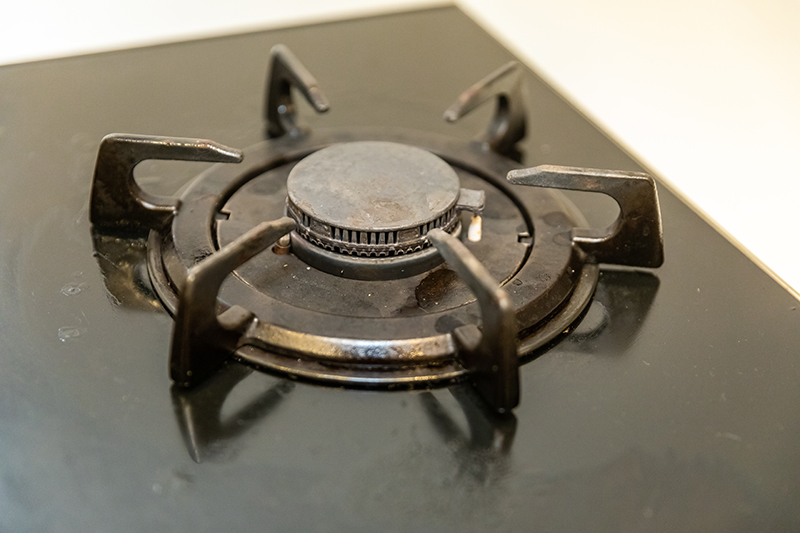
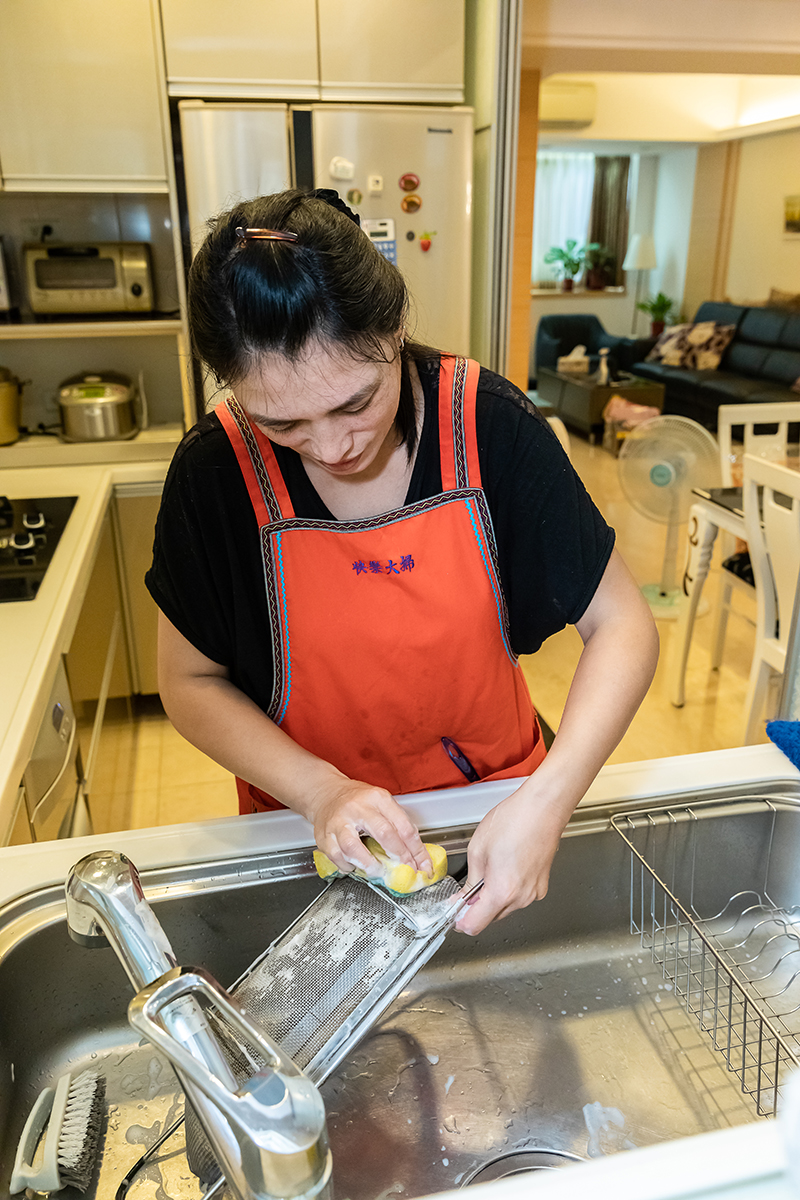
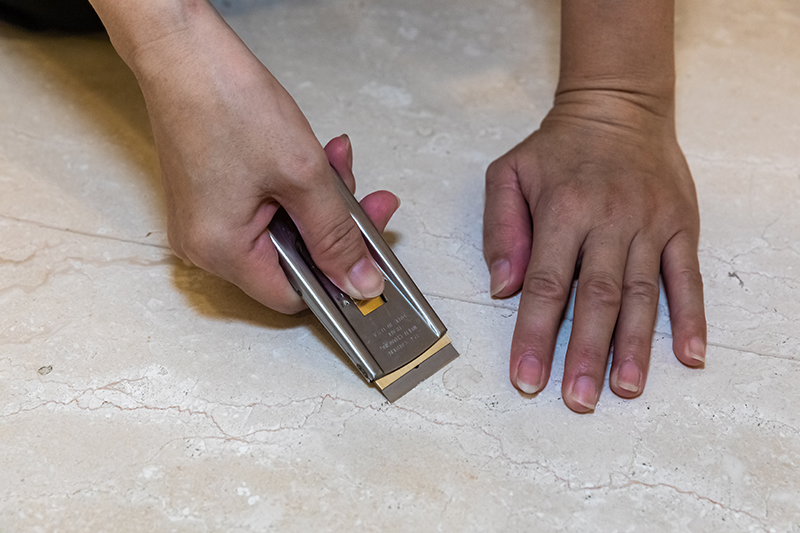
Tackling even the toughest dirt in the kitchen, with the tricks domestic cleaners learned over the years, even a stove covered completely in grease can be squeaky clean. Domestic cleaner scraping away the black stain discovered on the floor.




